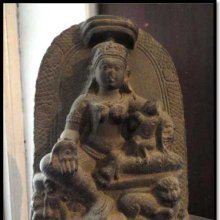Shubhankara, Śubhaṅkara, Subhamkara, Shubhamkara: 7 definitions
Introduction:
Shubhankara means something in Hinduism, Sanskrit, Marathi, Jainism, Prakrit. If you want to know the exact meaning, history, etymology or English translation of this term then check out the descriptions on this page. Add your comment or reference to a book if you want to contribute to this summary article.
The Sanskrit term Śubhaṅkara can be transliterated into English as Subhankara or Shubhankara, using the IAST transliteration scheme (?).
Images (photo gallery)
In Hinduism
Kavya (poetry)
Source: Wisdom Library: KathāsaritsāgaraŚubhaṅkara (शुभङ्कर) is one of the ministers of Sūryaprabha, son of king Candraprabha, according to the Kathāsaritsāgara, chapter 44. Accordingly, as Vajraprabha said to Naravāhanadatta: “... And all his ministers flew up after him, with their weapons in their hands, Prahasta, and Prabhāsa, and Bhāsa, and Siddhārtha, and Prajñāḍhya, and Sarvadamana, and Vītabhīti and Śubhaṅkara”.
In chapter 47, Śubhaṅkara’s companion’s strength is considered equal to a great warrior (mahāratha), according to the Kathāsaritsāgara, chapter 47. Accordingly, as the Asura Maya explained the arrangement of warriors in Sunītha’s army: “... the companions of [Śubhaṅkara, and others] are great warriors”.
The story of Śubhaṅkara was narrated by the Vidyādhara king Vajraprabha to prince Naravāhanadatta in order to relate how “Sūryaprabha, being a man, obtain of old time the sovereignty over the Vidyādharas”.
The Kathāsaritsāgara (‘ocean of streams of story’), mentioning Śubhaṅkara, is a famous Sanskrit epic story revolving around prince Naravāhanadatta and his quest to become the emperor of the vidyādharas (celestial beings). The work is said to have been an adaptation of Guṇāḍhya’s Bṛhatkathā consisting of 100,000 verses, which in turn is part of a larger work containing 700,000 verses.

Kavya (काव्य, kavya) refers to Sanskrit poetry, a popular ancient Indian tradition of literature. There have been many Sanskrit poets over the ages, hailing from ancient India and beyond. This topic includes mahakavya, or ‘epic poetry’ and natya, or ‘dramatic poetry’.
Languages of India and abroad
Marathi-English dictionary
Source: DDSA: The Molesworth Marathi and English Dictionaryśubhaṅkara (शुभंकर).—a S Auspicious, propitious, favorable, conferring or promoting happiness or good fortune.
Marathi is an Indo-European language having over 70 million native speakers people in (predominantly) Maharashtra India. Marathi, like many other Indo-Aryan languages, evolved from early forms of Prakrit, which itself is a subset of Sanskrit, one of the most ancient languages of the world.
Sanskrit dictionary
Source: Cologne Digital Sanskrit Dictionaries: Shabda-Sagara Sanskrit-English DictionaryŚubhaṅkara (शुभङ्कर).—mfn.
(-raḥ-rā-raṃ) Propitious, auspicious, conferring happiness or fortune. f. (-rī) Parvati. E. śubha happiness, kṛ to make, khac aff.
Source: Cologne Digital Sanskrit Dictionaries: Yates Sanskrit-English DictionaryŚubhaṅkara (शुभङ्कर):—[śubha-ṅkara] (raḥ-rā-raṃ) a. Propitious. f. (ī) Pārvatī.
Source: DDSA: Paia-sadda-mahannavo; a comprehensive Prakrit Hindi dictionary (S)Śubhaṃkara (शुभंकर) in the Sanskrit language is related to the Prakrit word: Subhaṃkara.
Sanskrit, also spelled संस्कृतम् (saṃskṛtam), is an ancient language of India commonly seen as the grandmother of the Indo-European language family (even English!). Closely allied with Prakrit and Pali, Sanskrit is more exhaustive in both grammar and terms and has the most extensive collection of literature in the world, greatly surpassing its sister-languages Greek and Latin.
Prakrit-English dictionary
Source: DDSA: Paia-sadda-mahannavo; a comprehensive Prakrit Hindi dictionarySubhaṃkara (सुभंकर) in the Prakrit language is related to the Sanskrit word: Śubhaṃkara.
Prakrit is an ancient language closely associated with both Pali and Sanskrit. Jain literature is often composed in this language or sub-dialects, such as the Agamas and their commentaries which are written in Ardhamagadhi and Maharashtri Prakrit. The earliest extant texts can be dated to as early as the 4th century BCE although core portions might be older.
Kannada-English dictionary
Source: Alar: Kannada-English corpusŚubhaṃkara (ಶುಭಂಕರ):—[adjective] = ಶುಭಕರ - [shubhakara -] 1
--- OR ---
Śubhaṃkara (ಶುಭಂಕರ):—[noun] = ಶುಭಕರ - [shubhakara -] 2.
Kannada is a Dravidian language (as opposed to the Indo-European language family) mainly spoken in the southwestern region of India.
See also (Relevant definitions)
Partial matches: Shubha, Nakara.
Starts with: Shubhamkaragattige, Shubhamkarakattige.
Ends with: Sushubhankara.
Full-text: Shubhamkara, Shubhakara, Sarvashubhamkara, Samgitadamodara, Pragalbha acarya, Kumaralabha, Hastamuktavali, Kshemakara, Uluka, Ambika, Vitabhiti, Shridhara, Khandana-khanda-khadya, Prajnadhya, Sarvadamana, Gunja, Tithinirnaya, Dhanya.
Relevant text
Search found 10 books and stories containing Shubhankara, Śubhaṅkara, Subhamkara, Shubhamkara, Subhankara, Shubha-nkara, Śubha-ṅkara, Subha-nkara, Subhaṃkara, Subhaṅkara, Śubhaṃkara, Śubhankara; (plurals include: Shubhankaras, Śubhaṅkaras, Subhamkaras, Shubhamkaras, Subhankaras, nkaras, ṅkaras, Subhaṃkaras, Subhaṅkaras, Śubhaṃkaras, Śubhankaras). You can also click to the full overview containing English textual excerpts. Below are direct links for the most relevant articles:
Bhakti-rasamrta-sindhu (by Śrīla Rūpa Gosvāmī)
Verse 2.1.154 < [Part 1 - Ecstatic Excitants (vibhāva)]
Verse 2.1.27 < [Part 1 - Ecstatic Excitants (vibhāva)]
Verse 3.2.13 < [Part 2 - Affection and Service (dāsya-rasa)]
Jain Remains of Ancient Bengal (by Shubha Majumder)
Śāsanadevīs or Yakṣiṇīs from Ancient Bengal < [Chapter 6 - Iconographic Study of Jaina Sculptural Remains]
Chapter 7 - Summary and Observations
Caubisi type of Ṛṣabhanātha sculptures < [Chapter 6 - Iconographic Study of Jaina Sculptural Remains]
Chaitanya Bhagavata (by Bhumipati Dāsa)
Verse 2.49 < [Chapter 2 - The Lord’s Manifestation at the House of Śrīvāsa and the Inauguration of Saṅkīrtana]
Vishnudharmottara Purana (Art and Architecture) (by Bhagyashree Sarma)
1. A Note on Music < [Chapter 2 - Music]
Trishashti Shalaka Purusha Caritra (by Helen M. Johnson)
Part 12: Sixth incarnation as Vajranābha < [Chapter II - Previous births of Pārśvanātha]
Part 2: Former births of Rāvaṇa, Sītā, Lakṣmaṇa, Sugrīva, Bhāmaṇḍala, Lavaṇa and Aṅkuśa < [Chapter X - Rāma’s mokṣa (emancipation)]
Shishupala-vadha (Study) (by Shila Chakraborty)
Date of the poet Māgha < [Introduction]
